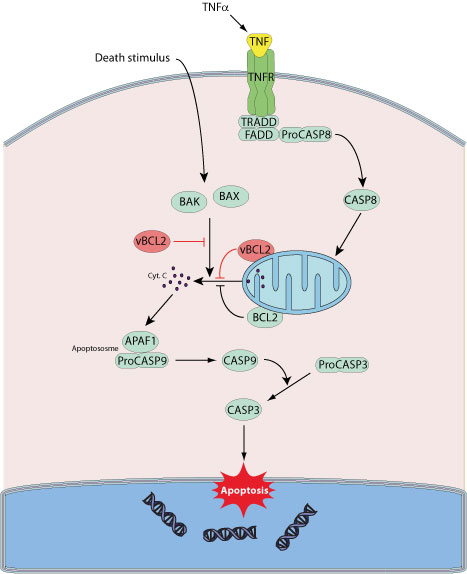Inhibition of host apoptosis by viral BCL2-like protein (kw:KW-1081)
Cellular Bcl-2 family proteins regulate critical steps in programmed cell death pathway by modulating mitochondrial permeability and function. They can be divided on two distinct groups, anti-apoptotic members such as Bcl-2 and Bcl-Xl that prevent cell death and pro-apoptotic elements like Bax and Bak that promote apoptosis.

Bcl-2 family proteins are also encoded by several large DNA viruses, including all known gamma herpesviruses, adenoviruses, and several other unrelated viruses. Viral Bcl-2 proteins can prevent cell death but often escape cellular regulatory mechanisms that govern their cellular counterparts. Compared to the cellular Bcl-2, viral Bcl-2 members are shorter and are often devoid of a membrane-anchored domain. Even with low level of homology with Bcl-2 such as adenovirus E1B19K, all viral Bcl-2 proteins analyzed so far are able to block apoptosis.
Matching UniProtKB/Swiss-Prot entries
(all links/actions below point to uniprot.org website)37 entries grouped by protein
10 entries
Apoptosis regulator Bcl-2 homolog
1 entry
Apoptosis regulator DPV022
15 entries
E1B protein, small T-antigen (E1B 19 kDa protein) (E1B-19K)
3 entries
Apoptosis regulator BHRF1 (Early antigen protein R) (EA-R) (Nuclear antigen)
6 entries
Apoptosis regulator OPG045 (Protein F1)
1 entry
Bcl-2-like gene 16 protein
1 entry
